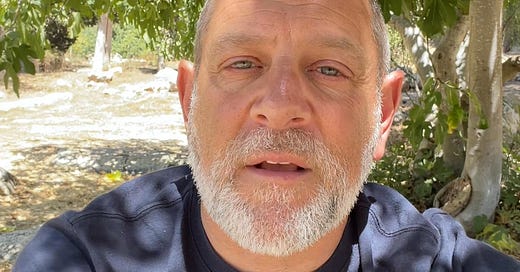Playback speed
×
Share post
Share post at current time
Share from 0:00
0:00
/
0:00
Transcript
The Harp of Healing
Weekly Vid Recap of Below the Bible Belt
Sep 06, 2024
After a tumultuous week here in Israel, funerals and protests, rage and sorrow, first days of the last month of the year and fall breezes -- I’m sitting under a fig tree — and yearn for consolation, and for music that will help hold me and heal.
Maybe that’s why our ancestors - who’ve had many long and complex weeks to deal with, chose to insert psalms of praise and songs of solace into our Friday night liturgy. We welcome the Sabbath Queen within with whatever music helps our souls to soar. The psalm we read yesterday includes mention of the mythic harp or lyre that David kept above his bed, an alarm clock that would wake up each midnight as the northern wind would pluck the strings, wake up the king, who would then be a poet, composing these psalms and immersed in deep prayer.
There are other fragments of fiction that go along with this beautiful depiciton of the ideal leader - poet-king, awake at night to sing to the soul of the world.
The Midrash of Rabbi Eliezer claims that the strings of David’s harp were made from the sinews of the ram offered by Abraham instead of his son Isaac. The story of the Binding if chanted on the first days of the new Jewish year, a month away - and somehow this feels fitting to this time, and this moment. What is the sound of those strings that are associated with so much devotion and the dark side of faith, the death-cult that is part of our precious legacy and life?
The Babylonian Talmud has more to tell us about this instrument, quoting a tradition that the harp played in the Temple had seven strings - but that in the future, the Messiah of David’s line will play on an additional eighth string, as is written in Psalm 12: “For the leader, on the sheminit” - which may mean the name of an instrument with eighth strings.
This has the echos of infinity - the number eight on its side, playing on and on, a loop of midnight strings forever.
This is connected to the idea that in the world to come - when all peace prevails upon us, a never ending Sabbath will be accompnaied by a psalm played with ten strings. This futurist idea comes from a close reading of Psalm 92 - “A psalm. A song for the sabbath day…With a ten-stringed harp, with voice and lyre together” (Psalms 92:1-4).
So clearly, we need music to help mend our hearts and souls, to wrap this week and enter into Sabbath with some psalms and strings and inspiration.
Here’s one more option to inspire us as we continue to explore these psalms below the bible belt. Leonard Bernstein’s epic Chichester Psalms, with this recording of verses from Psalm 108- the one we just read yesterday. This is with The New York Philharmonic, and The Camerata Singers.
Wishing us all consolation and courage, late night liturgies and lullabies, soul songs and as many strings attached to hope and peace and better days as possible.
Thank you for joining me below the bible belt.
From Jerusalem - Shabbat Shalom.
Recent Posts












Share this post